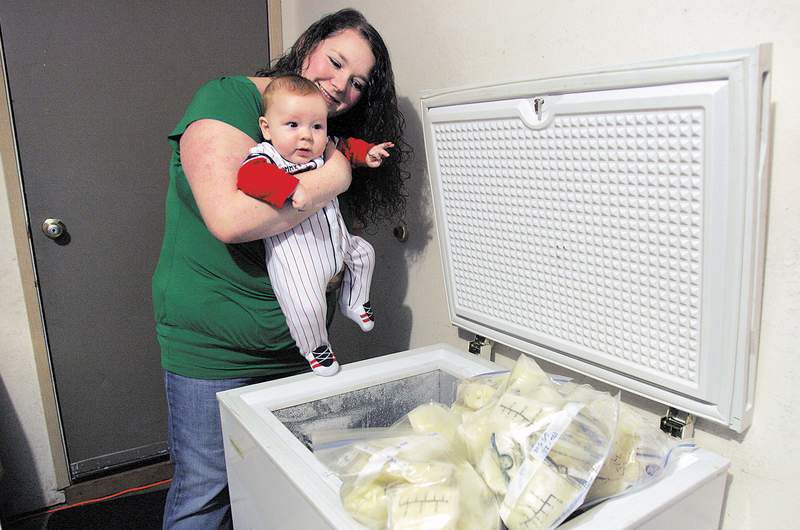Breast milk donations
Published 5:00 am Thursday, March 31, 2011

- Geeni Bellamy holds her son, Trace Derrey, as they look at about 400 ounces of frozen excess breast milk that Bellamy has saved. She plans to donate about 350 ounces.
Mothers who pump excess breast milk can now donate it to St. Charles Bend and St. Charles Redmond. Hospital staff will ship the frozen milk to the Mothers Milk Bank in San Jose, Calif., where it will be pasteurized and then delivered to hospitals and families that need it.
The donated breast milk is prioritized for medical necessity and used primarily for premature infants in neonatal intensive-care units around the region. St. Charles has some frozen breast milk on hand for this use.
Trending
But milk donated locally doesn’t stay at St. Charles, nor does it necessarily get returned from San Jose to Oregon families. There is an effort afoot to develop a milk bank in Portland, and once it opens, milk donated in Central Oregon will go there instead of San Jose, according to St. Charles lactation consultants.
Currently, there are 11 milk banks across the nation. The closest are in San Jose and Denver. Several more, including the one in Portland, are in the works.
The American Academy of Pediatrics recommends breast-feeding to reduce illness in infants. Worldwide health organizations recommend breast-feeding as the optimal source of nutrition for infants in their first year of life, said Becky McColl, a lactation consultant and registered nurse at St. Charles Bend. She and Marilyn Watkins, a lactation consultant and registered nurse at St. Charles Redmond, helped organize this milk donation program.
Right now, acquiring donated breast milk for babies requires a doctor’s order, said Watkins. The milk is reserved for medical necessity and not typically available to the general public. But if a family has a baby with allergies or other health concerns, they should ask their pediatrician about buying breast milk. With a prescription, families can contact the San Jose bank to buy milk if there’s enough available. It costs almost $5 an ounce, the nurses said. Whether insurance covers it depends on the state and the insurance policy, even when the milk is used in the intensive care unit, the nurses said.
Central Oregon’s first donor has gone through the screening process and is excited to offer her surplus to the babies who need it most.
Geeni Bellamy, a 24-year-old mother of a 4 1/2-month-old boy, is donating 350 ounces.
Trending
Soon after her baby, Trace Derrey, was born, Bellamy saw a lactation nurse to make sure breast-feeding was working out. In 15 minutes of nursing, Derrey consumed 1.5 ounces of breast milk — a generous amount. “The nurse was very happy,” Bellamy recalled. “I was the only person without a supply issue at that time. She gave me a pamphlet for the San Jose bank.”
When Derrey was 3 weeks old, Bellamy started pumping, she said. Since she had an abundant breast milk supply, the surplus quickly added up. Bellamy works full time at Professional Credit Services, a collection agency, and she pumps in a tiny conference room at least four times a day. Derrey’s dad or day care provider feeds him with bottles of breast milk when Bellamy is at work.
At least 4 ounces a day goes into the freezer, sometimes much more. Bellamy has a small chest freezer in her garage, where labeled plastic bags of frozen milk consume a couple of turkeys worth of space. She has about 400 ounces — about three gallons.
“Donating was in the back of my mind, but when I reached the point when I was running out of room for it, I pursued it further,” she said.
To donate, women need to contact the Mothers Milk Bank in San Jose for a telephone screening. If they are considered eligible, they get blood drawn at the St. Charles laboratories in Bend or Redmond for additional screening. The blood is sent to San Jose. Once the blood tests are done, a woman can start donating milk. Donors are asked to freeze the milk and bring in a combined suggested donation of 100 ounces to the Bend or Redmond hospitals. There is no fee for those interested in becoming donors.
In late February, Bellamy started the screening process that includes a medical history, her doctor’s and Derrey’s pediatrician’s consent, and blood tests that screen for hepatitis and AIDS. The process was wrapped up by mid-March.
Bellamy said she knows some people really want to breast-feed but just can’t. “I’ve been blessed with the ability to create so much milk and I can help someone else’s baby,” she said. “It’s the best thing you can give your child, or someone else’s child. I want to be able to do that.”








